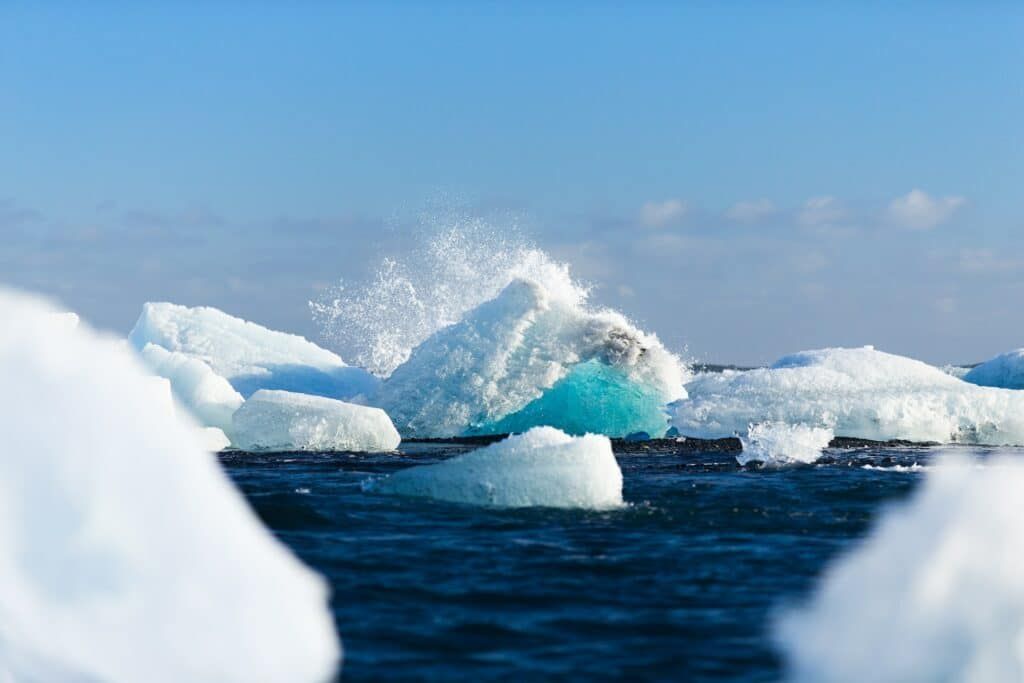Melting sea ice accelerates acidification of the Arctic Ocean
By Karen McVeigh | October 3, 2022
 Photo by Anders Jildén on Unsplash
Photo by Anders Jildén on Unsplash
Editor’s note: This story was originally published The Guardian. It appears here as part of the Climate Desk collaboration.
Acidification of the western Arctic Ocean is happening three to four times faster than in other ocean basins, a new study has found.
The ocean, which absorbs a third of all of the carbon dioxide in the atmosphere, has grown more acidic because of fossil fuel use. Rapid loss of sea ice in the Arctic region over the past three decades has accelerated the rate of long-term acidification, according to the study, published in Science on Thursday.
Researchers from the Polar and Marine Research Institute at Jimei University, China, and the School of Marine Science and Policy at the University of Delaware in the US, say rapid sea-ice loss exposes seawater to the atmosphere, promoting takeup of carbon dioxide at a faster rate than in the Atlantic, Pacific, Indian, Antarctic and sub-Antarctic basins.
“In other ocean systems, acidification is being driven by an increase in atmospheric carbon dioxide, which is increasing at a rate of around 2ppm [parts per million] per year,” said Wei-Jun Cai, a marine chemistry expert at the University of Delaware and one of the paper’s authors.
Acidification trends tend to follow those predicted from carbon dioxide increases over time, he said. But when the scientists compared data collected from the Arctic between 1994 and 2020 with ocean basins elsewhere, they found acidification was happening much faster in the Arctic.
“We were shocked to see acidification is happening three to four times faster,” Cai said.
If sea ice continues to vanish in the western Arctic, the process could continue and intensify over the next few decades, the scientists predict.
The research follows a separate study in August, which found that the Arctic has warmed at about four times the global average rate over the past 43 years. The faster warming, known as Arctic amplification, is a feedback process driven by melting sea ice, which is also driving faster acidification, the researchers say.
“The ice melt dilutes or lowers the alkalinity of the seawater. This dilutes the buffering capacity of the water, its ability to resist acidification,” Cai said.
The effect of the altered seawater chemistry will have “huge implications” for sea life, Cai predicts. As an example, he referred to studies that show ocean acidification is a threat to coral reefs.
“In lower latitudes, you have coral reefs and if you add carbon dioxide to the water, the carbon saturation rate will increase and the coral won’t grow,” he said. Acidification reduces the carbonate ions needed to build coral skeletons.
The lower pH, or acidity, of seawater could affect many systems, and could even make some metals more toxic, he added.
“We are far from knowing what the cost is for biological systems. We don’t know what organisms could be affected. This is something the biological community needs to look into.”

Together, we make the world safer.
The Bulletin elevates expert voices above the noise. But as an independent nonprofit organization, our operations depend on the support of readers like you. Help us continue to deliver quality journalism that holds leaders accountable. Your support of our work at any level is important. In return, we promise our coverage will be understandable, influential, vigilant, solution-oriented, and fair-minded. Together we can make a difference.
Keywords: Arctic, climate crisis, ocean acidification, sea ice
Topics: Climate Change














